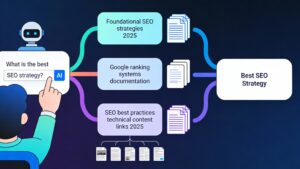The era of the “10 blue links” is over. For two decades, SEO was a battle for a single top spot. Today, the battlefield has moved into the realm of Generative Search Optimization (GSO), where AI-powered answers sit atop the results page, stealing clicks and redefining what it means to “rank.” As thought leader David Quaid of Primary Position argues, this is the Great Decoupling—where impressions no longer guarantee traffic. To win, we must understand the dual mechanisms driving this change: Cross-Engine Content Synthesis and the complex logic of the Query Fan-Out.
Table of Contents
Toggle1. The Synthesis Engine: Why Your Ranking Isn’t Enough
A common misconception is that Large Language Models (LLMs) like those powering Google’s AI Overviews or generative features in tools like Brave Search have their own, internal ranking systems. The reality is far more subtle:
The AI is not a search engine; it’s a synthesis engine that outsources search.
When a user submits a prompt, the AI doesn’t search its own memory. Instead, it:
-
Hands off the query to one or more underlying, traditional search indexes (which may include Google, Brave Search, or other proprietary web indexes).
-
Receives a ranked list of results (the classic SERP).
-
Synthesizes the information from the highest-ranking, most authoritative sources on that list, weaving them together into a single, cohesive AI Overview.
-
Cites the original sources used in the summary.
The take-away for SEOs: Traditional ranking factors (like link authority and technical SEO) still matter because they determine which sources the AI sees in the first place. If your content isn’t on the first page of the organic results, the AI is unlikely to select it for synthesis, regardless of how well-written it is.
2. Decoding the Query Fan-Out (QFO)
The second, more fundamental shift is how the AI processes a complex user request, a concept David Quaid refers to as the Query Fan-Out (QFO).
In the past, a user might have typed a simple keyword like “best running shoes.” Now, with conversational AI, they type a nuanced prompt: “Find two affordable tickets for this Saturday’s Yankees game in the lower level.”
This single, complex prompt triggers the Query Fan-Out: the AI breaks the request down into a cluster of simpler, distinct sub-queries to ensure it gathers all the necessary information:
-
Sub-query 1: “Yankees game tickets Saturday”
-
Sub-query 2: “affordable ticket prices”
-
Sub-query 3: “lower level seating availability”
The AI then retrieves results for each sub-query, aggregates the content, and provides a synthesized answer to the user.
The New Content Strategy: Ranking for 3 Queries to Help 1 Prompt
This mechanism means content strategy must move away from optimizing a page for one single keyword. The goal is to optimize a single, comprehensive piece of content to rank for the multiple sub-queries an AI might generate.
To thrive in the QFO era, your content must:
-
Anticipate the Fan-Out: Structure your page to address related questions and secondary keywords in logical, easily scannable sections (H2s and H3s).
-
Demonstrate Comprehensive Topical Authority: By answering multiple related queries thoroughly, you signal to the AI that your page is the single best, authoritative source on that entire topic cluster.
The Path Forward: From SEO to GSO
The AI is not looking for content that is simply “written by a human” or “stuffed with keywords.” It is looking for content that meets the highest standards of clarity, structure, and reliability.
To ensure your content is chosen and cited by the synthesis engine during a Query Fan-Out, you must embrace Generative Search Optimization (GSO):
-
Structure for Extraction: Use clear headings, bullet points, and numbered lists. Ensure factual statements are direct and quotable.
-
Prioritize Citability: Double down on establishing clear E-A-T signals (Expertise, Authoritativeness, and Trustworthiness) to make your site a preferred source for AI.
-
Master the Deep Answer: Instead of competing for simple, top-of-funnel queries that AI will easily summarize (leading to zero clicks), focus on complex, high-intent queries that require synthesized, in-depth answers.
The AI may be rewriting the SERP, but the new rules simply amplify the importance of a fundamental principle: the most helpful, trustworthy, and well-structured content will always win.





